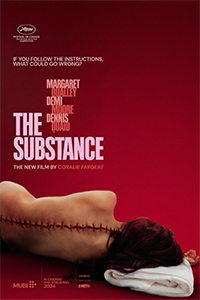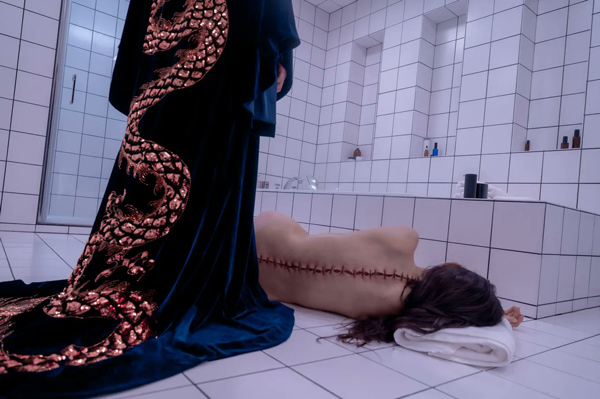Woman of Substance: Fargeat Rejuvenates Body Horror with Pulpy Parable
 To borrow a succinct phrase from Beyonce, ‘pretty hurts,’ a sentiment quivering through Coraline Fargeat’s morbidly entertaining sophomore feature, The Substance. Its simplistic title eventually reveals itself to be a vicious bit of irony, considering it refers to a magical titular potion which seems fashioned for those who are actually lacking substance, their worth defined solely by the superficiality of youth and beauty. Los Angeles turns out to be ground zero for this unique riff on Death Becomes Her (1992), plus a formidable array of other cult titles in what is essentially a ‘be careful what you wish for’ moral fable. Demi Moore headlines in what might stand as the most daring role of her career as an aging entertainer cast aside when the sleazy producer of her television fitness program deems her to be over the hill. Fargeat starts out in slow, familiar territory before slamming into fever pitch for a Grand Guignol bloodbath which might just be the best bit of straight faced body horror since Cronenberg’s clutch of 1980s titles solidified its merits as a veritable sub-genre.
To borrow a succinct phrase from Beyonce, ‘pretty hurts,’ a sentiment quivering through Coraline Fargeat’s morbidly entertaining sophomore feature, The Substance. Its simplistic title eventually reveals itself to be a vicious bit of irony, considering it refers to a magical titular potion which seems fashioned for those who are actually lacking substance, their worth defined solely by the superficiality of youth and beauty. Los Angeles turns out to be ground zero for this unique riff on Death Becomes Her (1992), plus a formidable array of other cult titles in what is essentially a ‘be careful what you wish for’ moral fable. Demi Moore headlines in what might stand as the most daring role of her career as an aging entertainer cast aside when the sleazy producer of her television fitness program deems her to be over the hill. Fargeat starts out in slow, familiar territory before slamming into fever pitch for a Grand Guignol bloodbath which might just be the best bit of straight faced body horror since Cronenberg’s clutch of 1980s titles solidified its merits as a veritable sub-genre.
Elisabeth Sparkle (Moore) has enjoyed a successful career as an actor and entertainer. Having won an Academy Award, she’s currently enjoying her career as a fitness guru with a successful television career. But as she wraps filming her latest episode, which just so happens to be on her fiftieth birthday, she’s retired by the show’s smarmy producer (Dennis Quaid), to be replaced by someone who’s younger and more profitable. On the same day, she’s involved in a car accident where she miraculously suffers no injuries. But while at the hospital, an encounter with a creepy orderly finds her in the possession of a mysterious USB Flash Drive which advertises something called “The Substance,” an injectable serum which allows you to live a separate life in a younger body for seven days at a time. But, the ominous narrator warns, the two bodies are actually one, and there are no exceptions to the seven day rule. Not quite believing what she’s seen, Elisabeth decides to try the serum, and sure enough, a younger woman (Margaret Qualley) springs from her body. Immediately, the woman, calling herself Sue, auditions to be Elisabeth’s replacement and nails her audition. The only trouble is, Sue doesn’t want to keep sharing her time with Elisabeth (not to mention the rather grisly upkeep, which includes injecting herself with Elisabeth’s spinal fluid every day to maintain herself). When the seven day rule is initially violated, Elisabeth notices there are irreparable changes to her body. But there’s no controlling Sue, not really. Until Elisabeth decides the price she’s paying might be too high.
The tabloid fodder and airbrush snafus which have followed Moore make her casting reminiscent of Gloria Swanson playing Norma Desmond in Billy Wilder’s noir classic Sunset Boulevard (1950). But Fargeat’s shifting narrative twists and turns away from more simplistic readings to highlight how women can be their own unique victimizers as Elisabeth’s inherent self-loathing solidifies her downfall. Margaret Qualley, similar to her bit part in Poor Things (2023), is fashioned as an ideal feminine body (her rampant abuse of the system also recalls one of her mother Andie MacDowell’s romantic comedies, Multiplicity, 1996). Her cruelty towards Elisabeth, her ‘matrix,’ begins to transform the woman into an old crone, which suddenly makes The Substance begin to feel like, of all things, Aronofsky’s Requiem for a Dream (2000).

A pulsating score from Raffertie (who also worked on an episode of I May Destroy You and Paul Andrew Williams’ underrated 2021 title Bull) enhances Sue’s titillating pushing of boundaries, while DP Benjamin Kracun (Promising Young Woman, 2021) lends a doomed glow to the sparkly Los Angeles sunshine (not to mention fashioning Elisabeth’s swank apartment into an increasingly toxic lair). What begins as fodder for a Tales from the Crypt design eventually takes on an increasingly troubling psychological dimension for Moore as Elisabeth, and there’s a viciousness spiking the violent face off between the two women which bleeds into a fleeting compassion often hard to establish in genre utilizing such heavy-handed subtexts (see Nicolas Winding Refs’s The Neon Demon, 2016). Elisabeth’s isolation is alarming, considering her fame, waning or not. While Fargeat’s film is clearly hyperbolic, there’s some bitter, grim believability in her ability to disappear.

Dr. Jekyll and Mr. Hyde initially seems to be a template, but Fargeat instead taps into hardboiled 1980s nightmare fuel, like Larry Cohen’s The Stuff (1985), anything by Frank Henenlotter, and, in its final act, Brian Yuzna’s Society (1989). Production designer Stanislas Reydellet also pays visual homage to Kubrick with a film studio which looks like a hallway lifted out of the Overlook, eventually a site for bloodletting we haven’t seen since Carrie’s infamous prom sequence.
Fargeat opens the film with the construction of Elisabeth’s star on the Hollywood Walk of Fame, utilizing this as an excellent bookend for the wounded woman’s final moments. Fargeat purposefully utilizes off-putting caricatures for the male characters crossing the paths of both women, most substantially being a despicable Dennis Quaid as an obnoxious chauvinist showrunner, cavorting like the nightmare version of Will Ferrell in Barbie (2023). This lends The Substance a greasy, trashy sheen, which eventually evens out as the film’s tone becomes more exaggerated, earning comparison to Julia Ducournau’s Titane (2021). But Fargeat’s film is arguably darker, and the hollow triumph for Elisabeth is fantastically cynical, a perfectly morose finale for a film which embraces a bitter aftertaste. It might as well be whispering in the final throes of its heroines’ delusion, “Sparkle, Lizzie. Sparkle.”
Reviewed on May 19th at the 2024 Cannes Film Festival – Competition. 140 Mins
★★★★/☆☆☆☆☆


